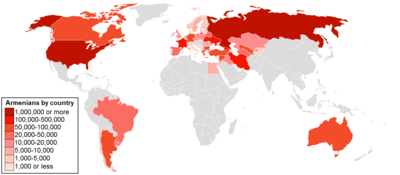
The Czech Republic, also known as Czechia, is a landlocked country in Central Europe. Historically known as Bohemia, it is bordered by Austria to the south, Germany to the west, Poland to the northeast, and Slovakia to the southeast. The Czech Republic has a hilly landscape that covers an area of 78,871 square kilometers (30,452 sq mi) with a mostly temperate continental and oceanic climate. The capital and largest city is Prague; other major cities and urban areas include Brno, Ostrava, Plzeň and Liberec.

Eastern Europe is a subregion of the European continent. As a largely ambiguous term, it has a wide range of geopolitical, geographical, ethnic, cultural, and socio-economic connotations. The vast majority of the region is covered by Russia, which spans roughly 40% of the continent's landmass while accounting for approximately 15% of its total population.

This article is about the demographic features of the population of the Czech Republic, including population density, ethnicity, education level, health of the populace, economic status, and religious affiliations.
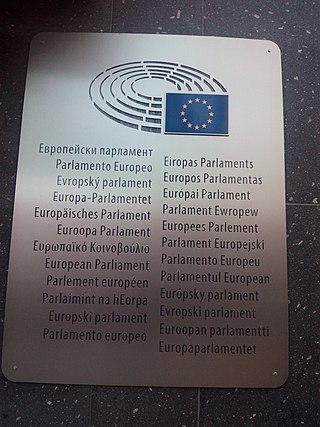
The European Union (EU) has 24 official languages, of which three – English, French and German – have the higher status of "procedural" languages of the European Commission. Irish previously had the lower status of "treaty language" before being upgraded to an official and working language in 2007. However, a temporary derogation was enforced until 1 January 2022. The three procedural languages are those used in the day-to-day workings of the institutions of the EU. The designation of Irish as a "treaty language" meant that only the treaties of the European Union were translated into Irish, whereas Legal Acts of the European Union adopted under the treaties did not have to be. Luxembourgish and Turkish, which have official status in Luxembourg and Cyprus, respectively, are the only two official languages of EU member states that are not official languages of the EU.

Miloš Zeman is a Czech politician who served from 2013 to 2023 as the third president of the Czech Republic and eleventh president since the Czechoslovak declaration of independence. He also previously served as the prime minister of the Czech Republic from 1998 to 2002. As leader of the Czech Social Democratic Party during the 1990s, he is credited with the revival of the party into one of the country's major political forces. Zeman briefly served as the President of the Chamber of Deputies from 1996 to 1998.
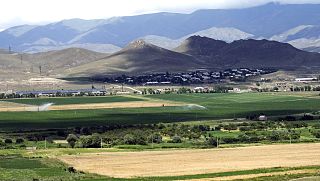
Spitak, is a town and urban municipal community in the northern Lori Province of Armenia. It is 96 km (60 mi) north of the capital, Yerevan, and 22 km (14 mi) west of the provincial center, Vanadzor. Spitak was entirely destroyed during the devastating 1988 earthquake, and it was rebuilt in a slightly different location. Currently, the town has an approximate population of 11,000 as per the 2016 official estimate.
Education in Armenia is held in particular esteem in Armenian culture. Education developed the fastest out of the social services, while health and welfare services attempted to maintain the basic state-planned structure of the Soviet era, following Armenia's independence in 1991. Today, Armenia is trying to implement a new vision for its higher education system while pursuing the goals of the European Higher Education Area. The Ministry of Education and Science oversees education in the country.

There are an estimated 20,000 Muslims in the Czech Republic, representing 0.2% of the country's population. The growing Turkish community form the largest Muslim population in the country.

Armenia is located in the Caucasus region of south-eastern Europe. Armenian is the official language in Armenia and is spoken as a first language by the majority of its population. Armenian is a pluricentric language with two modern standardized forms: Eastern Armenian and Western Armenian. Armenia's constitution does not specify the linguistic standard. In practice, the Eastern Armenian language dominates government, business, and everyday life in Armenia.
Mongolians in the Czech Republic form one of the country's smaller ethnic groups. Although the workers from Mongolia comprised 3.6% of the foreign workforce as of 2008, the group has grown over the last decade and numbered 10,236 men and women holding Mongolian nationality by June 2020. By 2011 they had declined both in numbers and in relative size to other foreign populations, having been surpassed by Russians and Moldovans. However, the group began to resume its growth after 2014 once again. Currently, a large group of Mongolians reside in the city of Ceska Lipa and its surrounding area.

Czech Republic–Russia relations are the bilateral foreign relations between the Czech Republic and the Russian Federation. Relations have substantially deteriorated in recent years due to events such as the Russian annexation of Crimea in 2014, Russian sabotage of Czech ammunition depot in Vrbětice in 2014, poisoning of Sergei Skripal in 2018 and Russian invasion of Ukraine in 2022.
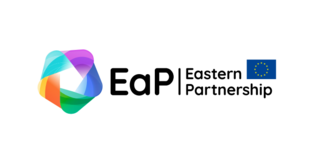
The Eastern Partnership (EaP) is a joint initiative of the European External Action Service of the European Union (EU) together with the EU, its member states, and six Eastern European partners governing the EU's relationship with the post-Soviet states of Armenia, Azerbaijan, Belarus, Georgia, Moldova, and Ukraine. The EaP is intended to provide a forum for discussions regarding trade, economic strategy, travel agreements, and other issues between the EU and its Eastern European neighbours. It also aims at building a common area of shared values of democracy, prosperity, stability, and increased cooperation. The project was initiated by Poland and a subsequent proposal was prepared in co-operation with Sweden. It was presented by the foreign ministers of Poland and Sweden at the EU's General Affairs and External Relations Council in Brussels on 26 May 2008. The Eastern Partnership was inaugurated by the European Union in Prague, Czech Republic on 7 May 2009.
The Greeks in the Czech Republic have a presence dating back to the 20th century. Roughly 12,000 Greek citizens, mainly from Greek Macedonia in Northern Greece, who fled from the 1946–1949 Greek Civil War were settled in several formerly German inhabited areas in Czechoslovakia.
Chinese people in the Czech Republic form one of the country's smaller migrant communities.
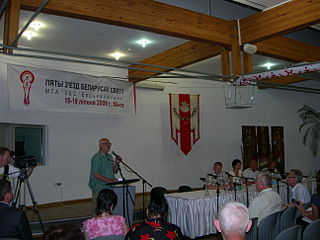
The Belarusian diaspora refers to emigrants from the territory of Belarus as well as to their descendants.
Armenians in Central Asian states: Uzbekistan, Kazakhstan, Kyrgyzstan, Tajikistan and Turkmenistan, were mainly settled there during the Soviet era for various reasons.

Orer, Armenian European Independent Magazine was established in September 1999 in Prague. The publisher is the Information Centre Caucasus-Eastern Europe international non-governmental organisation with the editor-in-chief Hakob Asatryan. The bimonthly magazine not only covers the life of Armenians living in the Czech Republic, but also the community life, sports, cultural, and political life of Armenians throughout more than 30 European countries of the world as well as ongoing events in Armenia.
The Prague Process is a regional policy process and a targeted migration dialogue promoting migration partnerships among its 50 participating states of the European Union, Schengen Area, Eastern Partnership, the Western Balkans, Central Asia, Russia and Turkey.

The European Political Community (EPC) is an intergovernmental forum for political and strategic discussions about the future of Europe, established in 2022 after the Russian invasion of Ukraine. The group first met in October 2022 in Prague, with participants from 44 European countries, as well as the Presidents of the European Council and the European Commission.

The First European Political Community Summit was the inaugural meeting of the European Political Community held on 6 October 2022 in Prague, Czech Republic. It was attended by the heads of state or government of forty-four European countries. Russia and Belarus were not invited.















